Table of Contents
- 9+ Comparative Research Templates in PDF | DOC
- 1. Comparative Research on Education
- 2. Comparative Research on Non Profit Organisation
- 3. Comparative Research Example
- 4. Comparative Research Format
- 5. Simple Comparative Research
- 6. Standard Comparative Research
- 7. Sample Comparative Research
- 8. Distinctiveness of Comparative Research
- 9. Causal Comparative Research
- 10. Developing Comparative Research
- An Explanation of Comparative Research
- Types of Comparative Research
- Types of Research Design
FREE 9+ Comparative Research Templates in PDF | MS Word
Comparative research is a social sciences research methodology which seeks to make parallels across different variables. A major issue in comparative analysis is that datasets might identify categories differently in different countries (e.g., use different definitions of poverty) or may not use the same categories.

9+ Comparative Research Templates in PDF | DOC
1. Comparative Research on Education
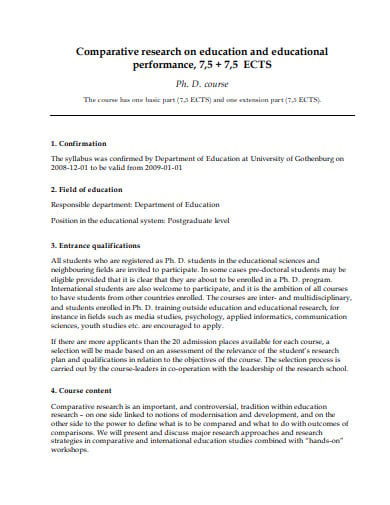 lincs.gu.se
lincs.gu.se2. Comparative Research on Non Profit Organisation
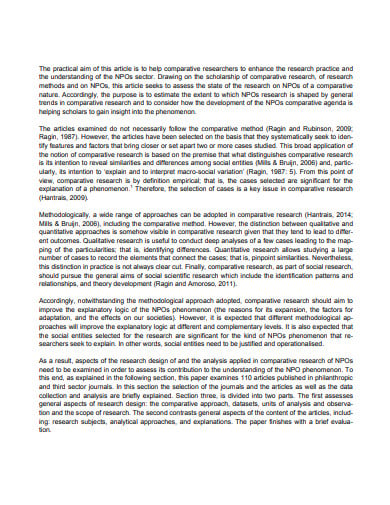 ceps.unibas.ch
ceps.unibas.ch3. Comparative Research Example
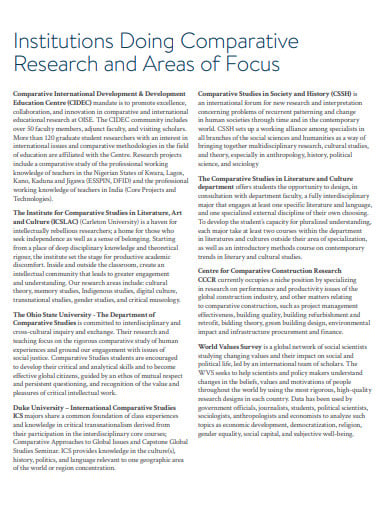 brandonu.ca
brandonu.ca4. Comparative Research Format
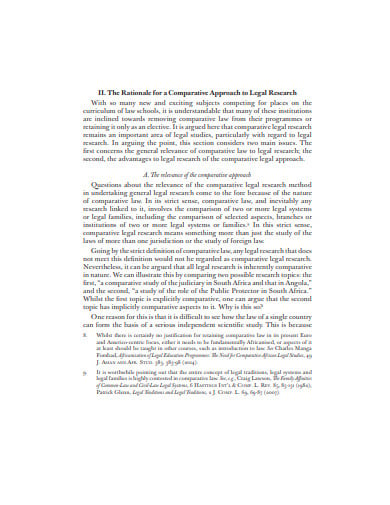 jle.aals.org
jle.aals.org5. Simple Comparative Research
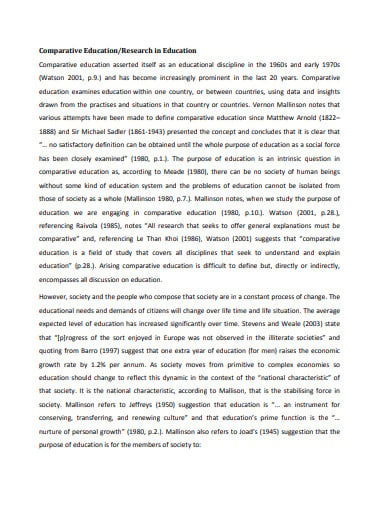 mural.maynoothuniversity.ie
mural.maynoothuniversity.ie6. Standard Comparative Research
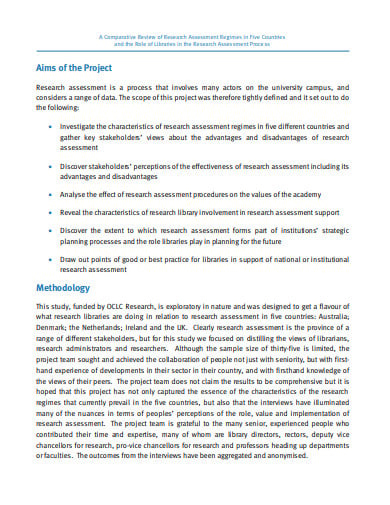 oclc.org
oclc.org7. Sample Comparative Research
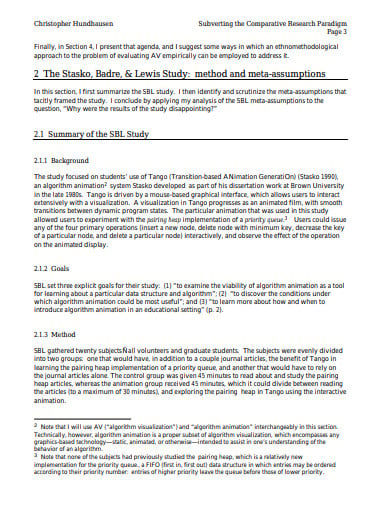 eecs.wsu.edu
eecs.wsu.edu8. Distinctiveness of Comparative Research
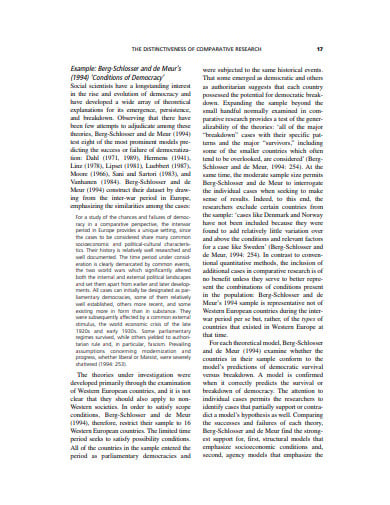 pdfs.semanticscholar.org
pdfs.semanticscholar.org9. Causal Comparative Research
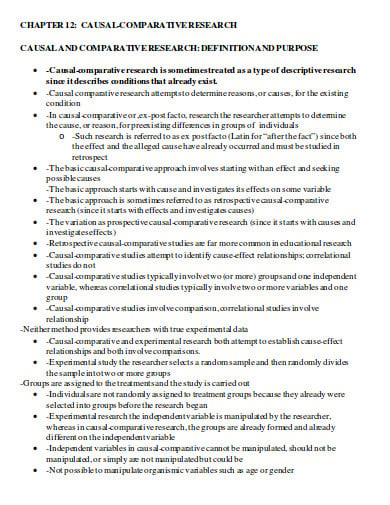 ndundam.people.cofc.edu
ndundam.people.cofc.edu10. Developing Comparative Research
 nuffieldfoundation.org
nuffieldfoundation.orgAn Explanation of Comparative Research
Simply put, a comparative analysis is a process of comparing two or more objects with a view to learning something about one or all of the comparable things. In one study, this technique often uses multiple disciplines. In the case of a process, the general consensus is that there is no technique unique to comparative research. It is a multidisciplinary approach that is good for the versatility it offers. However, comparative programs have a case to answer against their study’s call for lack of a “seamless whole.” For comparative studies, however, there are definitely approaches that are far more common than others.
Quantitative research is done much more often than qualitative, and the majority of comparative studies that use quantitative data demonstrate this. For comparative analysis, the basic process of comparing things is the same as in our everyday practice of comparison. Unlike cases, they are handled similarly, and different cases are treated differently; the magnitude of the discrepancy determines how to identify different cases. If you can distinguish two adequately, the results of the study will not be very helpful.
There are many forms of comparative research. Space and time are two key factors. Spatially, cross-national correlations are by far the most common, although comparisons within countries still subsist and are very positive and comparing with different areas, cultures or governments, especially in a country like New Zealand, where policies often change depending on the race to which they relate. Recurring interregional studies involve contrasting similar or different countries or sets of countries, comparing one’s own country to others or the world as a whole.
Types of Comparative Research
Comparative research is of four types:
- Personalizing comparison compares with a small number of cases to understand each case’s peculiarities. This simply involves a full description of the features or characteristics of each of the cases being studied. It helps to broaden our knowledge and provides insight into the in-depth look at cases. This simply involves a full description of the features or characteristics of each of the cases being studied. It helps to broaden our knowledge and provides insight into the in-depth look at cases.
- Comparison universalization seeks to determine that each instance of a phenomenon follows the same law. It includes using analogy to establish simple theories of considerable generality and relevance; goes further to include theories that clarify the cases being studied.
- Variation-finding comparison aims to ‘ establish a principle of variation in a phenomenon’s character or intensity by looking at systematic differences between instances. That is, to compare numerous forms of a single phenomenon to discover logical differences between instances and to develop a level of variation in the nature or intensity of that occurrence.
- Comparison place separate instances at different locations within the same system, on the way to understanding their features as a result of their differing system relationships.
Types of Research Design
Research designs are of five types:
1: Descriptive Research Design
A researcher is only interested in describing the situation or case under their research study in descriptive research design. It is a method of design based on the theory that is generated by capturing, analyzing and presenting the collected data. This helps a researcher to have insights into why and how work is done. Descriptive design is helping us understand the job needs better. If the definition of the issue is not clear, you may perform exploratory investigations.
2: Correlational or Comparative Research Design
Correlational research or comparative research is a technique of non-experimental research design that helps researchers to establish a relationship between two closely related variables. There is no presumption when analyzing a connection between two different variables, and the relationship between them is calculated using statistical analysis techniques. A coefficient of correlation measures the association between two variables, whose value varies from -1 to + 1. If the coefficient of correlation is towards + 1, it implies a positive relationship between the variables, and -1 shows a negative relationship between the two.
3: Diagnostic Research Design
Through diagnostic design, the researcher attempts to determine the root cause of a particular topic or phenomenon. This process should help us understand more about the factors generating complicated situations. This research design consists of three parts. This includes the beginning of the issue, the analysis of the issue, and the solution to the problem.
4: Explanatory Research Design
The explanatory design uses the ideas and thoughts of a researcher about a subject to explore their theories further. The research explains the unexplored aspects of a topic and details on what, how, and why research questions are raised.
5: Experimental Research Design
The design of experimental research establishes a relation between the cause and effect of a situation. It is a causal method where the effect on the dependent variable induced by the independent variable is observed. For example, one tracks an autonomous variable’s effect such as a price on a dependent variable like customer satisfaction or brand loyalty. It is a type of research design that is highly practical, as it helps solve a problem at hand. The independent variables are manipulated to control the shift on the variable that depends on it. Throughout social sciences, it is often used to analyze human behavior through the study of two classes. Studies can have participants alter their behavior and observe how they respond to gain a better understanding of social psychology from those around them.

